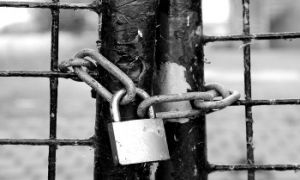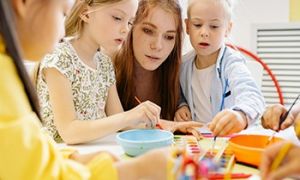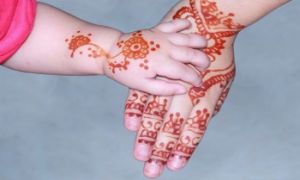The “Preschool Room” is final step for you, as a childcare professional, to prepare your group of children and their families for school and making the transition process from a childcare setting to the school setting an easier one.
Implementing a school readiness program in your childcare setting enables the children to develop their developmental skills in key learning areas such as literacy, numeracy and self help skills. By developing these skills you will be assisting each individual child's short and long term success at school. It is also a crucial stage to build positive relationships with each child as this is essential in developing their self esteem which will assist each child to make effective transitions from a childcare setting to school environments.
The School Readiness Program
The School Readiness Program doesn't have to be a separate part of the program. If your program covers all the aspects of the key developmental learning areas and provides opportunities for each child to extend on their interests and their needs, the program itself will develop opportunities for encouraging the skills needed for starting school.
It is important to remember that the school readiness program should enable the children to use their current skills and interests as a basis for learning rather than requiring children to complete academic tasks. It is not necessary for children to be “forced” into completing academic tasks such as letter worksheets, number worksheets etc. However, if a child is interested in these tasks then by all means add it onto the program but you don't need to “force” all the children complete it. It's our duty to make each individual child into confident learners to set the foundation for lifelong learning.
Developmental Skills To Support Preschoolers
Below listed are developmental skills that supports a child's school readiness. The skills are separated in each of the appropriate developmental learning areas. You can use the skills as part of your program in determining suitable experiences for the preschool children. The list of developmental skills are a essential part of a child's short and long term success when starting school.
Cognitive Skills
Cognitive skills to Support Preschoolers to:
- show curiosity and interest in learning new things.
- have the confidence to learn.
- be interested and show a willingness to solve problems.
Language Skills
Language skills to support preschoolers to:
- ask questions and communicate thoughts and ideas.
- listen to others.
- enjoy listening to stories and being read to.
Social and Emotional Skills
Social and emotional skills to support preschoolers to:
- participate in play.
- approach children in a positive way and make new friends.
- show an interest in others and make friends.
- express individual needs and wants.
- cope and deal with conflict in an appropriate manner.
- express emotions.
- take turns and sharing.
- follow and understand directions and rules.
- cope with transitions.
Self Help Skills
Self help skills to support preschoolers to:
- use the toilet unassisted.
- dress and undress themselves, independently.
- deal with small amounts of supervision.
- unpack own lunch box and drink from a drink bottle.
- deal with a structured environment.
Physical Skills
Physical skills to support preschoolers:
- run, jump and balance.
- use equipment such as balls and climbing equipment.
- use pencils, crayons, textas, glue and scissors.
The skills listed above are important in supporting a preschooler through to school. There is always a misconception that children should be “taught” in preschool. Yes we should teach the children through their interests and needs but not because they require academic success to begin school. It is our duty to assist a preschool child in transitioning to school through a variety of experiences and making each a confident learner, they have the rest of their lives to be taught.
School Readiness Experiences
Within your program, there are specific experiences that the preschoolers can participate in, to assist them in preparing for school. These experiences will enable the children to extend on their current skills and abilities and provide opportunities to learn new developmental skills needed when starting school. The school readiness experiences include:
- Having regular “lunch box days” so children can practice opening and closing their lunch box and eating their own lunch.
- Encourage children to participate in group games and experiences.
- Supporting each child to develop friendships and co-operate with peers.
- Talk positively with children about starting school.
- Encourage children's independence in all self help skills.
- Discuss school visits and orientation event with children before and after they occur.
- Help children to use crayons. pencils, textas, glue and scissors unassisted.
- Read with children regularly.
- Invite guests to talk to parents about school readiness and the transition to school.
- Arrange visits to local schools so children can experience a school environment and school activities.
Supporting Families
During this stage a lot of families will have concerns regarding their child, during the process of stating school for the first time. A school readiness program should put the families at ease.
As a childcare professional, it's important to keep the parents informed about school readiness and transition to school. This can be verbally or through a monthly newsletter.
Provide opportunities for parents to come and meet with you to discuss any concerns or issues they are having regarding their child. During the meeting you can provide families with “information packs” which provides families with information sheets about transitioning to school etc.
Get in touch with local primary schools and ask them to send you information about the school as well as dates of school orientations or bookings.
Not only are the children transitioning to school but also their families. It is a whole new world starting school and parents will need support and information from you. The families have trusted you with their child and being in the preschool room is the last step before entering the next chapter of life. So, please be encouraging and supporting to all children and families and provide them with any information necessary to provide families with a better understanding of this process.
In supporting each individual child to develop the skills they need to help prepare them for school. It is important for us as childcare professionals to collaborate with parents in determining the overall strengths, interests and needs of each individual child. This way we can guarantee that each child has an opportunity to become better learners and begin to support their transition to school.


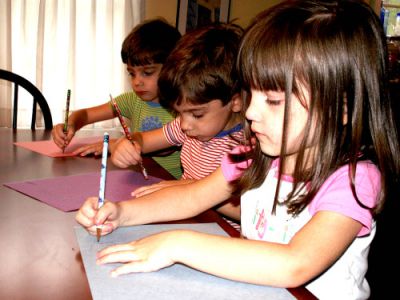
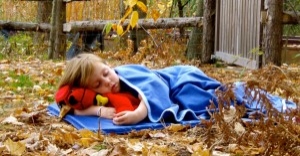 In Norway and most other Scandinavian countries, children nap in the outdoors. According, to research outdoor sleeping not only promotes better daytime sleeping, but it
In Norway and most other Scandinavian countries, children nap in the outdoors. According, to research outdoor sleeping not only promotes better daytime sleeping, but it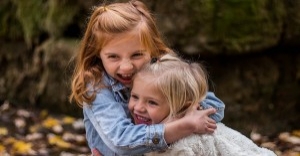 Feel Good Feb is dedicated to saying thanks, expressing gratitude, and promoting good deeds and random acts of kindness.
Feel Good Feb is dedicated to saying thanks, expressing gratitude, and promoting good deeds and random acts of kindness.
 Here’s a comprehensive Mobile Phone and Smart Watch Policy tailored for early childhood education and care (ECEC) services in Australia, aligned with the latest 2025
Here’s a comprehensive Mobile Phone and Smart Watch Policy tailored for early childhood education and care (ECEC) services in Australia, aligned with the latest 2025 Across the early childhood education and care sector, educators are sounding the alarm: current staffing ratios are insufficient to deliver safe, meaningful, and developmentally appropriate
Across the early childhood education and care sector, educators are sounding the alarm: current staffing ratios are insufficient to deliver safe, meaningful, and developmentally appropriate Thanks to the new National Model Code and upcoming regulatory changes under the National Quality Framework (NQF), early childhood services across Australia must now implement
Thanks to the new National Model Code and upcoming regulatory changes under the National Quality Framework (NQF), early childhood services across Australia must now implement In the quiet hum of a weekday morning, something felt off. Preschool doors opened, but classrooms remained silent. No greetings. No redirection. No educators. And
In the quiet hum of a weekday morning, something felt off. Preschool doors opened, but classrooms remained silent. No greetings. No redirection. No educators. And A: In early childhood education and care (ECEC) settings across Australia, mobile phone use by educators is now subject to strict national reforms aimed at
A: In early childhood education and care (ECEC) settings across Australia, mobile phone use by educators is now subject to strict national reforms aimed at The end of the year is a busy and emotional time in early childhood services. Many services close for a short period over Christmas, and
The end of the year is a busy and emotional time in early childhood services. Many services close for a short period over Christmas, and In early childhood education and care, child safety is not just a number—it’s a practice. While educator-to-child ratios are essential, they are only one part
In early childhood education and care, child safety is not just a number—it’s a practice. While educator-to-child ratios are essential, they are only one part Being an educator is both rewarding and demanding. Between planning, documentation, room management, and supporting children’s wellbeing, the workload can feel overwhelming. That’s why practical
Being an educator is both rewarding and demanding. Between planning, documentation, room management, and supporting children’s wellbeing, the workload can feel overwhelming. That’s why practical